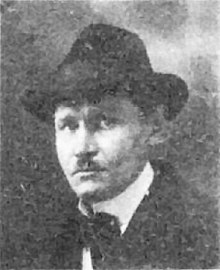Roman Becker
Roman Becker (born February 4, 1879 in Łódź in what was then Congress Poland ; † September 26, 1949 in Dresden ) was a German SPD politician .
Life and work
Roman Paul Becker attended elementary school in Gleiwitz from 1886 to 1892 and completed an apprenticeship as a painter in the same place in the three years that followed. In addition to Germany, his wanderings also took him to Austria and the Netherlands. From 1900 to 1901 Becker did his military service with the 51st Infantry Regiment and then worked as a painter's journeyman in Gleiwitz until 1910. Until the 1930s, he ran his painting business and a paint wholesaler in Gleiwitz, as well as a restaurant on what was then Germania-Platz The regular pub of the Gleiwitz SPD served. Becker was the father of one daughter and five sons. At the First World War Becker took until January 1918 as a soldier in part and worked until November of the year in a munitions factory. In the 20s he became prosperous and led a bourgeois lifestyle in a large villa in the street Im Erlengrund , with cars and house staff. As an SPD politician and successful businessman, Roman Becker was a rather rare figure in his time. After the National Socialists came to power, he immediately ran into problems. The windows of his restaurant were broken with stones several times by the SA , and loan cancellations were obtained through the banks, which cost him his company and his real estate and also led to the loss of the family villa. He quickly became impoverished during the National Socialist era , lived in a small two-room apartment on Langestrasse, his wife Emilie died on October 17, 1937. Becker earned his living with a bicycle courier service called Die Rote Radler , who carried out delivery trips in red uniforms. After the war he settled in Zittau, where his sister Margarete ran a hat shop before the war. Becker himself opened a buying and selling shop with an exchange center and also implemented the idea of the Rote Radler in Zittau. As a former member of the SPD and opponent of the National Socialist regime, he had no political problems in the Soviet-occupied zone. He died of heart failure in Dresden on the Neustädter Bahnhof on September 26, 1949. He was buried in Zittau.
Political career
In 1896 Becker joined both the SPD and the trade union and in 1901 became chairman of the trade union cartel in Gleiwitz, a post he held until 1908. In addition to this office, Becker was also chairman of the Handwerker-Krankenkasse from 1904 to 1908.
His union and political activities resulted in several fines. In 1908 he was sentenced to four weeks in prison for attempted coercion during a strike. After the end of the First World War he became chairman of the workers' council in Gleiwitz in November 1918 and shortly afterwards in 1919 took over the office of an unpaid city council in his homeland. In the time of National Socialism he got serious problems.
Parliamentary membership
Becker was a member of the constituent national assembly and the Reichstag until December 1922 as a member of constituency 10 ( Opole ).
literature
- Wilhelm Heinz Schröder : Social Democratic Parliamentarians in the German Reich and Landtag 1867-1933. Biographies, chronicles, election documentation. A handbook (= handbooks on the history of parliamentarism and political parties. Volume 7). Droste, Düsseldorf 1995, ISBN 3-7700-5192-0 , pp. 361-362.
- Hermann Hillger : Hillger's handbook of the constituent German national assembly 1919. Hilliger et al., Berlin et al. 1919, ZDB -ID 528863-0 , p. 173.
Web links
- Roman Becker in the database of members of the Reichstag
| personal data | |
|---|---|
| SURNAME | Becker, Roman |
| BRIEF DESCRIPTION | German politician (SPD), MdR |
| DATE OF BIRTH | February 4, 1879 |
| PLACE OF BIRTH | Łódź |
| DATE OF DEATH | September 26, 1949 |
| Place of death | Dresden |
